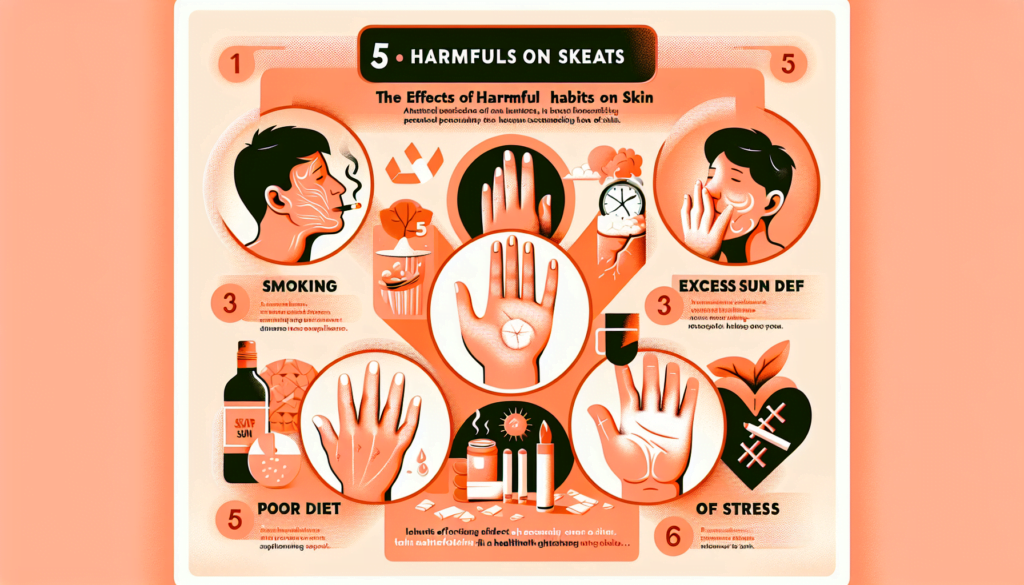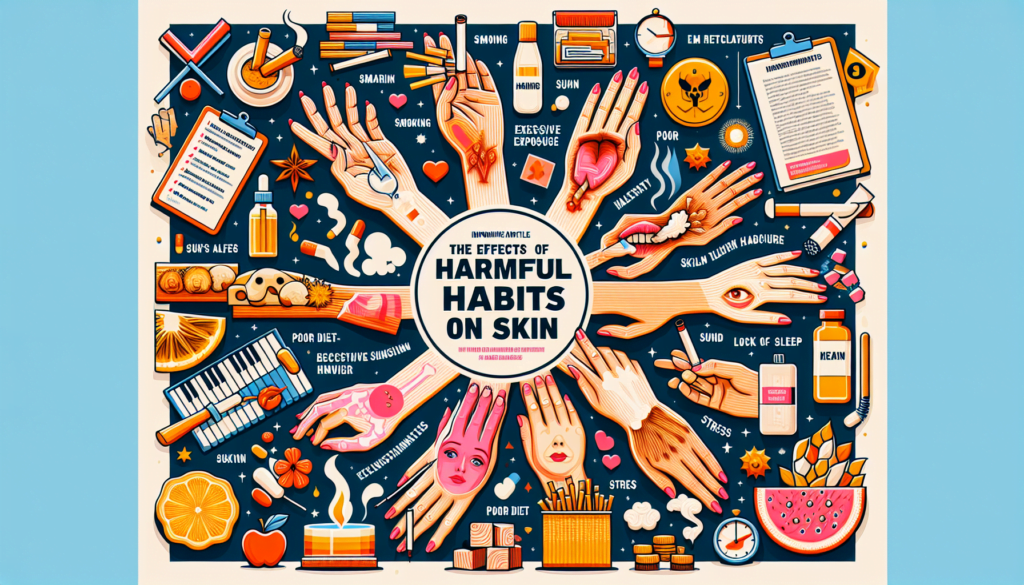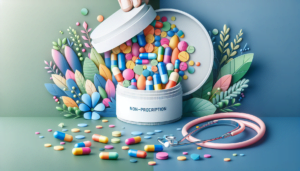Have you ever considered the effects of harmful habits on your skin? From the food we eat to the products we use, numerous factors can either promote or harm the health of our skin. In this article, we will explore the detrimental effects of certain habits on your skin and provide valuable insights into maintaining a healthy and radiant complexion. So, whether it’s that guilty late-night snack or an unhealthy skincare routine, buckle up and prepare to discover the secrets to preserving your skin’s natural beauty.

The Effects of Harmful Habits on Skin
Your skin is your body’s largest organ and plays a crucial role in protecting you from external elements. However, certain habits can harm your skin’s health and appearance. This article will discuss some everyday harmful habits and their specific effects on the skin. By understanding the consequences of these habits, you can make informed decisions to prioritize your skin’s well-being.
Excessive Sun Exposure
UV Radiation and Skin Aging
Spending too much time in the sun without proper protection can lead to premature skin aging. The sun emits harmful ultraviolet (UV) rays, specifically UVA and UVB, which penetrate the skin and damage its underlying structures. Over time, this damage can result in the breakdown of collagen and elastin, proteins that provide the skin firmness and elasticity. As a result, you may notice the development of fine lines, wrinkles, and sagging skin.
Sunburn and Skin Damage
One of the most immediate effects of excessive sun exposure is sunburn. Sunburn occurs when the skin is exposed to high levels of UV radiation, leading to redness, pain, and peeling. Besides the visible signs, sunburn also causes cellular damage to the skin, affecting its overall health. Repeated sunburns can weaken the skin’s protective barrier and increase the risk of long-term skin damage.
Increased Risk of Skin Cancer
Prolonged and unprotected exposure to the sun’s UV rays can significantly increase your risk of developing skin cancer. UVA and UVB rays can damage the DNA in skin cells, leading to mutations that can trigger the development of skin cancer. Melanoma, the deadliest form of skin cancer, is closely associated with sun exposure. Protecting your skin from the sun’s harmful rays is crucial by wearing sunscreen, seeking shade, and wearing protective clothing.
Smoking
Premature Aging and Wrinkles
Smoking tobacco products accelerates the aging process of the skin, causing premature aging and the formation of wrinkles. The chemicals in tobacco smoke constrict the blood vessels in the outermost layers of the skin, leading to reduced blood flow. This impairs the delivery of oxygen and essential nutrients to the skin, resulting in a loss of elasticity, increased dryness, and wrinkles.
Dull and Uneven Skin Tone
Smoking can also contribute to a dull and uneven skin tone. The toxins in cigarette smoke damage the small blood vessels in the skin, affecting its natural color and radiance. As a result, you may notice a lackluster complexion and an uneven distribution of pigmentation, known as depigmentation.
Reduced Blood Flow and Oxygen to the Skin
The harmful substances in tobacco smoke decrease blood flow to the skin, depriving it of oxygen and nutrients. This reduction in blood flow and oxygenation can result in a pale or ashen appearance to the skin. Furthermore, inadequate oxygen supply impairs the skin’s ability to heal and regenerate, leading to delayed wound healing and potentially more visible scars.

Poor Diet
Inflammation and Acne
A poor diet high in processed foods, sugary snacks, and unhealthy fats can contribute to inflammation in the body, including the skin. Inflammation can worsen existing acne and increase the likelihood of new breakouts. High-glycemic foods, such as refined carbohydrates and sugar, can cause spikes in blood sugar levels, increasing insulin production. Elevated insulin levels can stimulate the production of sebum, an oily substance that clogs pores and contributes to acne.
Lack of Essential Nutrients for Skin Health
A diet lacking essential nutrients can deprive your skin of the necessary building blocks for optimal health. Vitamins, minerals, and antioxidants maintain skin integrity and function. A deficiency in these nutrients can impair collagen synthesis, reduce the skin’s ability to retain moisture and compromise its protective barrier, making it more susceptible to damage and irritation.
Increased Skin Sensitivity and Prone to Irritation
A poor diet can also increase skin sensitivity and the likelihood of developing skin conditions such as eczema and psoriasis. Certain food additives, such as artificial colors and preservatives, can trigger allergic reactions and worsen skin conditions. Additionally, processed and unhealthy foods can contain inflammatory substances that aggravate sensitive skin and lead to redness, itching, and irritation.
Lack of Sleep
Dark Circles and Puffy Eyes
A lack of sleep can manifest as dark circles and puffy eyes, making your skin appear tired and aged. During sleep, the body repairs and rejuvenates itself, including the skin. When you neglect quality sleep, the blood vessels under the eyes can dilate, causing fluid buildup and puffy eyes. Lack of sleep can also lead to poor circulation, making dark circles more prominent.
Fine Lines and Wrinkles
Sleep deprivation can accelerate the formation of fine lines and wrinkles. While you sleep, the body produces collagen, a protein that provides structure and elasticity to the skin. Insufficient sleep can disrupt collagen production, leading to a breakdown in the skin’s supportive structure and the development of wrinkles.
Uneven Skin Tone and Dullness
A lack of sleep often results in a dull and uneven skin tone. During sleep, the body increases blood flow to the skin, promoting a healthy complexion and a radiant glow. When you consistently do not get enough sleep, blood flow to the skin decreases, and the complexion can appear sallow and lackluster.
Excessive Alcohol Consumption
Dehydration and Dry Skin
Excessive alcohol consumption can have significant repercussions on your skin’s hydration levels. Alcohol is a diuretic, which means it increases urine production and can lead to dehydration. Dehydrated skin lacks moisture and can become dry, flaky, and itchy. Furthermore, prolonged alcohol consumption can impair your body’s ability to retain moisture, exacerbating the issue of dry skin.
Enlarged Pores and Acne
Alcohol can also contribute to enlarged pores and an increased risk of acne breakouts. When you consume alcohol, it dilates the blood vessels in your skin, causing your pores to expand. Enlarged pores are more prone to becoming clogged with dirt, excess oil, and dead skin cells, leading to acne formation. Additionally, alcohol can disrupt the delicate balance of your skin’s natural oil production, resulting in increased oiliness and further acne breakouts.
Redness and Rosacea
Alcohol consumption can trigger or worsen skin conditions like rosacea, characterized by persistent redness and visible blood vessels. Alcohol causes blood vessels near the skin’s surface to dilate, increasing blood flow and facial flushing. Over time, this can lead to chronic redness and worsening existing rosacea symptoms.
Stress
Accelerated Skin Aging
Chronic stress can contribute to the accelerated aging of the skin. When you are under prolonged stress, your body releases cortisol, a hormone that can break down collagen and elastin, forming fine lines and wrinkles. Also, stress can impair the skin’s ability to repair itself, hindering wound healing and natural rejuvenation.
Worsened Skin Conditions such as Eczema and Psoriasis
Stress can exacerbate existing skin conditions, such as eczema and psoriasis. The release of stress hormones can disrupt the immune system, triggering flare-ups and increasing inflammation. Breakouts, itching, redness, and scales can worsen during heightened stress, making it crucial to manage stress levels for healthier skin.
Impaired Skin Barrier Function
Stress can compromise the skin’s protective barrier, leaving it vulnerable to external irritants and allergens. A weakened barrier function can increase sensitivity, dryness, redness, and irritation. It becomes easier for harmful substances to penetrate the skin, leading to potential allergic reactions and a compromised skin barrier’s ability to retain moisture.
Lack of Hydration
Dryness and Flaky Skin
Failing to drink enough water and stay hydrated can result in dry, dull, and flaky skin. Water is essential for maintaining the optimal functioning of skin cells and ensuring proper cell turnover. When dehydrated, your skin lacks the necessary moisture to stay plump and supple, leading to a rough and dehydrated appearance.
Increased Sensitivity and Irritation
Dehydrated skin is more susceptible to irritation and can become hypersensitive. The skin’s protective barrier becomes compromised without adequate hydration, allowing irritants to penetrate more easily. This can result in redness, itchiness, and a prickly sensation on the skin.
Accentuated Fine Lines and Wrinkles
Dehydration can accentuate the appearance of fine lines and wrinkles. When the skin lacks moisture, it loses elasticity and becomes less resilient. As a result, any existing fine lines and wrinkles become more pronounced, emphasizing the signs of aging.
Skipping Skincare Routine
The buildup of Dirt, Oil, and Dead Skin Cells
Skipping your skincare routine can accumulate dirt, oil, and dead skin cells on the skin’s surface. Throughout the day, your skin is exposed to pollutants, bacteria, and other impurities that can clog pores and contribute to breakouts. Neglecting proper cleansing and exfoliation allows these substances to accumulate, giving rise to a dull and congested complexion.
Clogged Pores and Acne
A neglected skincare routine can result in clogged pores and an increased risk of acne. Without regular cleansing, dirt, oil, and dead skin cells can accumulate within the pores, leading to blockages. These blockages can cause the formation of blackheads, whiteheads, and pimples. Consistently failing to address these clogged pores can exacerbate acne breakouts.
Reduced Efficiency of Skin Repair and Renewal
A consistent skincare routine is essential for maintaining the skin’s natural repair and renewal processes. Skincare products, such as moisturizers and serums, provide vital nutrients and hydration, promoting healthy cell turnover and supporting the skin’s ability to repair itself. Neglecting this routine hinders the skin’s ability to heal, leading to potential dullness, scarring, and a compromised complexion.
Not Removing Makeup
Clogged Pores and Breakouts
When you do not properly remove your makeup, it can clog your pores and contribute to breakouts. Makeup, especially foundation and heavy products, can accumulate in the pores, trapping oil, dirt, and bacteria. Over time, this buildup can lead to acne and other skin blemishes.
Skin Irritation and Allergic Reactions
Leaving makeup on the skin overnight or for extended periods can irritate and potentially trigger allergic reactions. Some ingredients in makeup products may not be suitable for prolonged exposure to the skin, leading to redness, itching, and inflammation. It is essential to thoroughly cleanse the skin to remove all traces of makeup, allowing the skin to breathe and recover.
Dull and Tired-looking Skin
Sleeping with makeup on can leave your skin dull, tired, and lackluster. Makeup can block the skin’s natural renewal process and prevent overnight rejuvenation during sleep. As a result, you may wake up to a tired complexion with uneven skin tone and texture.
In conclusion, harmful habits such as excessive sun exposure, smoking, poor diet, lack of sleep, excessive alcohol consumption, stress, lack of hydration, skipping skincare routine, and not removing makeup can harm your skin. By being aware of these consequences, you can make conscious choices to protect and prioritize the health and appearance of your skin. Remember, a few simple changes in your habits and incorporating a skincare routine can go a long way in maintaining a healthy and radiant complexion.


